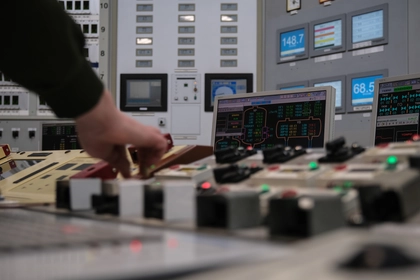Russia's war against Ukraine continues to accentuate the increasing nexus of economic and security issues, with Russia’s blockade forcing Ukraine to divert its grain exports through Poland via land routes or Romania’s Danube and Black Sea ports. Recently, Romania and Moldova have shown full solidarity with Ukraine, becoming the main route for exporting commodities. Despite other routes, Moldova and Romania remain strong and stable partners for Ukraine.
The EU, with backing from the United States, should endorse the modernization of this transport corridor, ensuring a free and open navigational channel from the Danube to the Black Sea to advance peace and prosperity in this corner of southeastern Europe. Romania has one of the largest infrastructures on the Danube and is quickly reaffirming its primacy as the commercial artery transporting all types of products, including grains, across southeastern Europe. For the foreseeable future, Russia’s occupation of eastern Ukraine and Crimea and the persistent threat to all Ukrainian ports render Romania the major commercial hub to export grain, through Moldova.
JOIN US ON TELEGRAM
Follow our coverage of the war on the @Kyivpost_official.
The business dynamics between Romania and Ukraine can easily integrate Moldova, which has the potential to become a smart and fast intermediary between the two, possessing know-how in both directions and benefiting from the presence of large multinational companies, such as Trans-Oil Group, operating in Ukraine, Romania, and Moldova. Furthermore, Moldova’s economy is stabilizing thanks to growing exports, the prospects of EU integration and foreign aid absorption, making it a resilient and reliable partner in the region.

Thinking Out Loud – Where We’re at, What’s at Stake, and What Ronald Would Have Said
Since the start of Russia's invasion, more than one million people fleeing military aggression against Ukraine have entered Moldova, which still hosts over 115,000 Ukrainian refugees. The country has also been heavily affected by high inflation, security threats, and other challenges. Stronger partnerships with Ukraine and Romania will allow it to overcome these serious challenges.
Given the current geopolitical and economic context, a change of mindset is needed among entrepreneurs in Romania, Moldova, and Ukraine to approach business strategy-making in a triangular manner. Despite the security challenges facing the region, a triangular focus is certain to open up new opportunities and strengthen ties between the business communities in the three countries. By improving commercial infrastructure and connectivity across Romania, Moldova, and Ukraine, as well as the rest of southeastern Europe, the region’s attractiveness for infrastructural and industrial development may be elevated, de-risking European and global supply chains. This is critical for Ukraine’s reconstruction after the war.
The EU, along with all investment banks, should see an opportunity in the triangular focus and prioritize infrastructure projects within the Global Gateway agenda and Global Partnership for Infrastructure Investments initiatives. Europe’s economic competitiveness is directly related to the efficiency of its transport infrastructure.
Kyiv reached a consensual decision at the G7 summit in Southern Italy involving strong military support and a $50 billion loan, backed by frozen Russian assets and a 10-year security pact with American military aid. The United States is sending a powerful signal of strong support for Ukraine. The international media noted that this was the 15th such bilateral agreement allies have inked with Ukraine, including a pact with Japan also signed at the summit in the Italian region of Puglia. But this is not enough for securing and rebuilding Ukraine, more strategic steps are necessary.
Over the past two years, Romania has become an indispensable partner for Ukraine, providing a gateway for Ukrainian goods and an open economic environment for investments in various fields. Notable examples include energy company DTEK, manufacturer and distributor of household and hygiene products Biosphere, and the IT company N-iX, among others. Additionally, the Romanian port cities Constanța and Galați have become crucial logistics hubs, supported by industry giants such as Maersk and DP World.
For Moldova, Romania’s future economic growth is essential, not only in terms of joint development of the business and trade ecosystem. The current dynamics at the border between Romania and Hungary may be matched, if not surpassed, in terms of trade, by those at the Romania-Moldova-Ukraine borders, especially in the context of the Ukrainian war economy and Ukrainian reconstruction.
In the wake of the Russian offensive and its major impact on cities such as Kharkiv, Ukraine continues to rethink its economy, with Romania consolidating its role as a gateway for Ukrainian exports. Moldova is definitely playing a middleman role in this process. Accelerated energy interconnection, supported by the European Union, the United States, and the United Kingdom, also highlights the potential for trilateral cooperation.
In addition to the obvious economic benefits, this trilateral cooperation holds the potential to transform the region into a fully-fledged regional hub and a major European player. For this to happen, the benefits and challenges of trilateral cooperation need to be well understood and addressed: we all need to be aware of the associated risks, starting from the security situation in the region and long-term perspectives.
It is high time for entrepreneurs in Romania, Moldova, and Ukraine to join forces and approach the future from a triangular perspective. At the same time, it is important that all three business communities recognize this triangular perspective as essential to their future.
While we are witnessing positive approaches in terms of government-to-government dialogues and bilateral or trilateral cooperation, the vibrant entrepreneurial communities of the three countries should step up and shape these ties in a way that further interconnects the three economies in the future, with political support from the EU and the US.
The views expressed in this opinion article are the author’s and not necessarily those of Kyiv Post.
You can also highlight the text and press Ctrl + Enter






